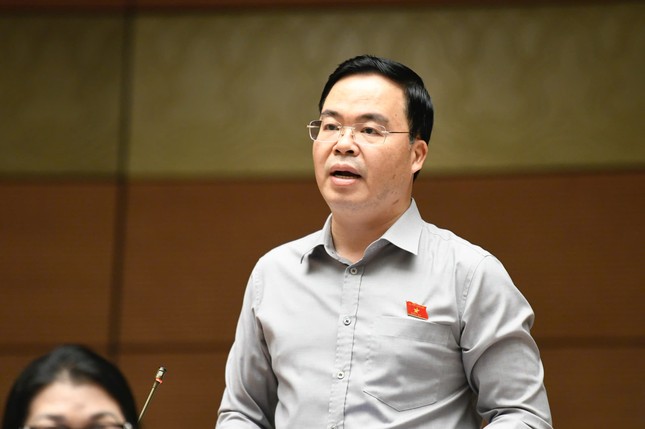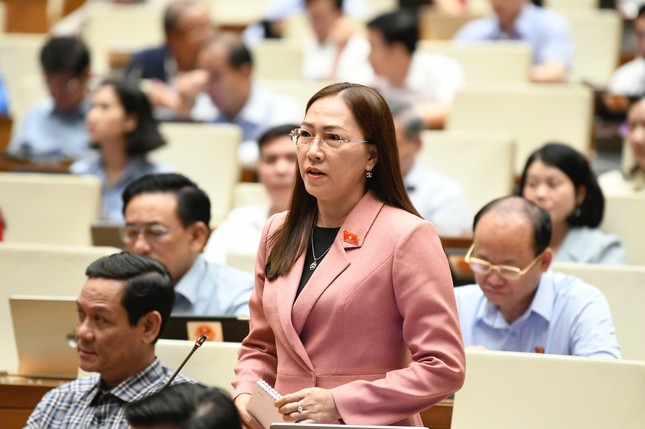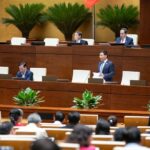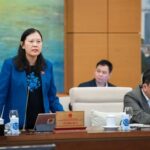Proposed Luxury Tax on Air Conditioners with High Capacity Only
During the ongoing session, on May 9th, the National Assembly discussed the draft Law on Special Consumption Tax (amended). Reporting on the absorption and explanation regarding the subject of taxation on air conditioners, Mr. Phan Van Mai, Chairman of the Committee for Economic Affairs and Finance, stated that the need for air conditioning has become prevalent to meet the demands of the people.
The Standing Committee of the National Assembly agreed with the government’s proposal to amend the draft law, suggesting that air conditioners with a capacity of 18,000 BTU to 90,000 BTU should be subject to special consumption tax (SCT). It was decided not to impose taxes on air conditioners with a capacity below 18,000 BTU and above 90,000 BTU.

National Assembly Deputy Tran Van Khai. Photo: Nhu Y
According to Mr. Tran Van Khai, Vice Chairman of the Committee for Science, Technology, and Environment, imposing a special consumption tax on air conditioners does not actually reduce their usage. Despite high taxes, people will still need to use them to ensure their daily lives and health.
This tax imposition unfairly targets ordinary consumers and goes against the spirit of taxing luxury or harmful items. Mr. Khai also argued that while large-capacity air conditioners (>90,000 BTU) are exempt, smaller units for households are taxed at 10%, resulting in inequality. Lower-income households using smaller units are taxed, while businesses or wealthier individuals installing central air conditioning systems with higher capacities are not subject to SCT.
Based on the above argument, Mr. Khai proposed removing or narrowing the scope of air conditioners subject to SCT, excluding domestic air conditioners (below 90,000 BTU) from the list of taxable items.
“If regulation is still necessary, SCT should only be applied to air conditioning systems with extremely high capacities, and its effectiveness should be carefully evaluated,” Mr. Khai suggested. “Removing the SCT for domestic air conditioners will directly support the people and encourage domestic production and assembly businesses to expand their market.”
While appreciating the drafters’ receptiveness to feedback, some opinions also suggested considering taxation for air conditioners with a capacity above 18,000 BTU. “Air conditioners with a capacity below 18,000 BTU are only suitable for small family rooms. In contrast, schools and hospitals typically require air conditioners with higher capacities, so this needs to be carefully considered,” expressed Delegate Duong Khac Mai (Dak Nong).

Delegate Nguyen Thi Yen Nhi. Photo: Nhu Y
Suggested Implementation of a Suitable Taxation Roadmap
Regarding the inclusion of sugary drinks in the scope of SCT, the reviewing agency stated that this is the first step in a process to limit the production and consumption of products with high sugar content in food and beverages. It contributes to guiding production and consumption patterns and is one of the main causes of obesity and non-communicable diseases related to diet. Therefore, the National Assembly’s Standing Committee proposed maintaining the draft law and requested that the Government continue studying international experiences to include other sugar-containing products in the scope of SCT,” said Mr. Phan Van Mai.
Delegate Nguyen Thi Yen Nhi (Ben Tre province) agreed with this proposal, stating that the situation among the younger generation regarding the consumption of these products is alarming. Therefore, the state’s intervention is necessary to adjust the consumption behavior of the people.
However, Delegate Tran Van Khai (Ha Nam province) argued that the concept of “sugary drinks according to Vietnamese standards” lacks a concrete definition, leading to concerns that natural products (such as coconut water and fruit juices) could be equated with sugary drinks.
Mr. Khai suggested developing a suitable taxation roadmap, possibly postponing the taxation until 2027 with a low initial rate (e.g., 5-8% in the first year) and gradually increasing it to 10%. This would give businesses, especially small and medium-sized enterprises, time to adapt and reformulate their products to reduce sugar content.
Additionally, the delegate proposed that a portion of the tax revenue from sugary drinks should be invested in preventive healthcare and nutritional education to ensure that the goal of protecting community health is sustainably achieved, rather than solely focusing on increasing state budget revenue.
“Sugar-Sweetened Beverage Consumption Soars: A Case for Special Consumption Tax to Ease Healthcare Burden”
“The alarming rise in consumption of sugary drinks in Vietnam is a pressing concern. With a steady increase in demand, the long-term health implications could pose a significant burden on the country’s healthcare system. This emerging trend warrants immediate attention to prevent a potential health crisis.”
“Gasoline is an essential commodity and should not be subject to special consumption tax.”
“Lawmakers argue that gasoline is an essential commodity for citizens’ livelihoods and a vital input for numerous industries. As it already incurs an environmental tax, the proposition of an additional consumption tax is unconvincing.”





















